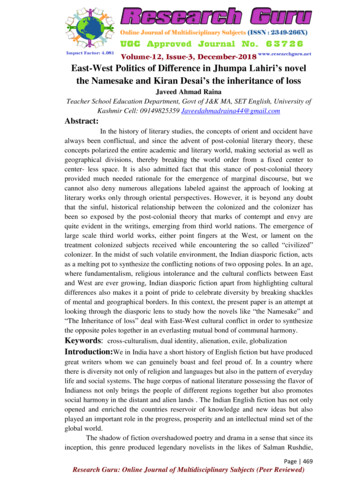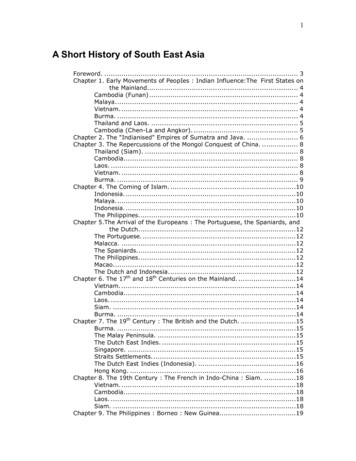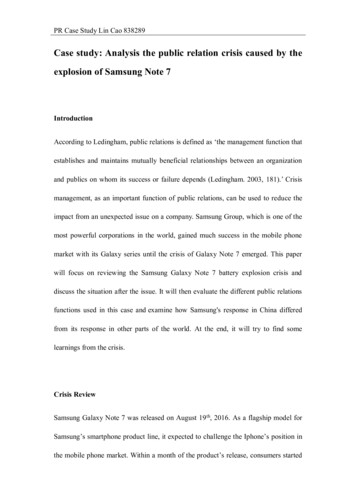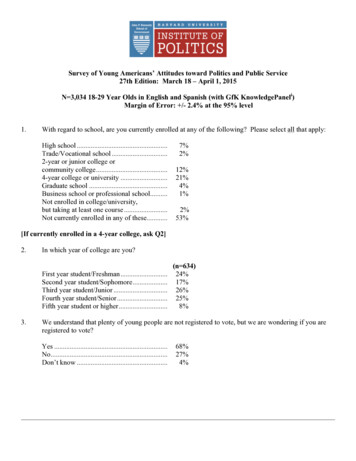
Transcription
East-West Politics of Difference in Jhumpa Lahiri’s novelthe Namesake and Kiran Desai’s the inheritance of lossJaveed Ahmad RainaTeacher School Education Department, Govt of J&K MA, SET English, University ofKashmir Cell: 09149825359 Javeedahmadraina44@gmail.comAbstract:In the history of literary studies, the concepts of orient and occident havealways been conflictual, and since the advent of post-colonial literary theory, theseconcepts polarized the entire academic and literary world, making sectorial as well asgeographical divisions, thereby breaking the world order from a fixed center tocenter- less space. It is also admitted fact that this stance of post-colonial theoryprovided much needed rationale for the emergence of marginal discourse, but wecannot also deny numerous allegations labeled against the approach of looking atliterary works only through oriental perspectives. However, it is beyond any doubtthat the sinful, historical relationship between the colonized and the colonizer hasbeen so exposed by the post-colonial theory that marks of contempt and envy arequite evident in the writings, emerging from third world nations. The emergence oflarge scale third world works, either point fingers at the West, or lament on thetreatment colonized subjects received while encountering the so called “civilized”colonizer. In the midst of such volatile environment, the Indian diasporic fiction, actsas a melting pot to synthesize the conflicting notions of two opposing poles. In an age,where fundamentalism, religious intolerance and the cultural conflicts between Eastand West are ever growing, Indian diasporic fiction apart from highlighting culturaldifferences also makes it a point of pride to celebrate diversity by breaking shacklesof mental and geographical borders. In this context, the present paper is an attempt atlooking through the diasporic lens to study how the novels like “the Namesake” and“The Inheritance of loss” deal with East-West cultural conflict in order to synthesizethe opposite poles together in an everlasting mutual bond of communal harmony.Keywords: cross-culturalism, dual identity, alienation, exile, globalizationIntroduction:We in India have a short history of English fiction but have producedgreat writers whom we can genuinely boast and feel proud of. In a country wherethere is diversity not only of religion and languages but also in the pattern of everydaylife and social systems. The huge corpus of national literature possessing the flavor ofIndianess not only brings the people of different regions together but also promotessocial harmony in the distant and alien lands . The Indian English fiction has not onlyopened and enriched the countries reservoir of knowledge and new ideas but alsoplayed an important role in the progress, prosperity and an intellectual mind set of theglobal world.The shadow of fiction overshadowed poetry and drama in a sense that since itsinception, this genre produced legendary novelists in the likes of Salman Rushdie,Page 469Research Guru: Online Journal of Multidisciplinary Subjects (Peer Reviewed)
Research Guru: Volume-12, Issue-3, December-2018 (ISSN:2349-266X)Arundhati Roy, Amitav Gosh, Aravind Adiga, Anita Desai, Jhumpa Lahiri, KiranDesai, Rohinton Mistry and others respectively. Among these broad spectrum ofnovelists, the current paper, as stated above, will try to study how a synthesis of Eastand West is carried out in the fiction of two immigrant novelists-Jhumpa Lahiri andKiran Desai .The aim of the study will be to place Jhumpa Lahiri and Kiran Desaiamongst the diasporic writers who have gained immense success critically as well asin popular circles. In the last section of the article, special attention will be given howthese writers connect local with the global context by exploring the impact ofcolonialism and globalization on Indian culture and how far are they able to transcendthe confines of their singular immigrant experiences and emerge as novelists whoseartistic quest can be seen in larger human terms.Discussion:Literature of Indian diaspora consists of the huge body of works mostlyequally nourished by both male and female contemporary novelists, with creative andimaginative ideas. As the women are more sensitive and prone to subtle changes inthe world around, they also experience and intricately record these experiences withminute details. The two Indian women diasporic novelists, Jhumpa Lahiri and KiranDesai are no exception in this case. They have rendered in fiction both trauma andtriumphs of immigrants, living in distant lands surrounded by an alien culture. Theircreative powers helped them achieve fame and glory globally. Jhumpa Lahiri Pulitzerprize winner of 2000 is regarded as the original and innovative writer of the diasporicdilemma and dreams. Similarly, Kiran Desai, a Booker prize winner of 2006possesses a unique power of creativity, showing the tales and tragedies of individualsand families of different cultures and religions placed either in the backdrop of ruralIndia or in the tempting and promising cities of America. The postmodernfragmentation is revealed through their protagonists wavering attitudes towardEnglishness, and self imposed departures from their homeland and comparisonsbetween mother country. Each of the Jhumpa Lahiri and Kiran Desai’s works expandrather than limits the reader’s engagement with the text. In their works, both readerand character exit the world they know and move towards a mutual goal, the readerengaging with a narrative plot while the character crosses a geographical one.The reason behind increasing critical attention these two post-colonial andperipheral writers demand globally is that their art of storytelling, handling of diversecharacters ,weaving of different plots together and their very intimate use of languagewhich makes the reader to suspend her/his judgment and aesthetically enjoy themarvelously woven plots. All these literary qualities among other factors make thesetwo Indian diasporic fiction writers as a worth reading. Also, the examination of EastWest conflict in these two South Asian women novelists becomes at once compellingas well as contemporaneous because much of today’s theoretical focus remain on suchissues as multiculturalism, alienation, hybridity, displacement, cross-culturalism,globalization, economic in-equability, and fundamentalism. As their works exemplifythe synthesis of immigrant woes and wedlock’s, loss and longing, alienation andbelonging, homelessness and motherland, real and imaginary, sense and sensibilities,Page 470Research Guru: Online Journal of Multidisciplinary Subjects (Peer Reviewed)
Research Guru: Volume-12, Issue-3, December-2018 (ISSN:2349-266X)local and global and center and periphery, they need to be explored realistically. Theutopian tenor of diaspora, and new era and season of discovery of India and abroad iscarried out through their non linear narration and hybrid language. They give voice tothe voiceless polygon of cultural and psychological forces rooting and de-rooting,assimilating and alienating the whole community of diasporas.Born to educated middle class Bengali parents in London, JhumpaLahiri grew up in Rhoads island (USA), thus gaining firsthand experience of “livingtwo lives in one” Her life divided among three worlds has made Lahiri very muchaware of “the intense pressure to be two things, loyal to the old world and fluent in thenew”. She realistically and succinctly portrays her diaspora experience in her firstcollection of short stories, Interpreter of Maladies (which won her the Pulitzer prizefor fiction in 2000), again in her first novel the Namesake and second collection ofshort story book the Unaccustomed Earth, she shows pains of alienation and duality ofliving in two worlds and tries to enjoin the two cultures. Infact, in the realm of SouthAsian diasporic fiction publication in the U.S, no one author can currently lay asmuch claim to the immortelle of renewal and reinvention as Jhumpa Lahiri. Lahiri haschampioned in the International critical arena as the quintessential “newcosmopolitan” purveyor of an “ethno-global vision”, interpreter of “immigrant angst”and creator of “different type of expatriate writing” whose work goes beyond labelssuch as ethnic or diasporic.Kiran Desai daughter of a renowned novelist Anita Desai (b.1971) is alsoan American Indian inspiring and award winning novelist writing about East westcultural identity and alienation crisis who herald new era and season of discovery ofIndia and abroad. She has written an exquisite novel which won the prestigiousBooker prize Award in 2006 and found a place in the New York Times most notablefiction list. The novel is rich in its stunning prose, complex characters and finelycaptured sense of place. Her first novel Hullabaloo in the Guava Orchard, publishedin 1998, received wide spread fame and praise. It won the Betty Task Award for thebest new novel by the citizens of the common wealth of nations under the age of 35.Eight years later The Inheritance of Loss won the Booker prize. This extraordinaryachievement makes her the youngest woman ever to win the Booker, a distinctionpreviously enjoyed by Arundhati Roy.Comparison:What these two novelists have common with each other is that both expressthe turmoil caused to immigrants as they try to settle down in an alien land. Bothemphasize on contemporary social milieu and cultural crisis in their adapted andnative land. They attempt to redefine emerging post-colonial issues of globalization,displacement, identitarianism and isolation. They mix the past, the present and thefuture and the imperial and colonial in their fiction, dislocating time, subverting theimperial and colonial purposes in the process and finally rejoining the two in a voicein which “India speaks” and offering a synthesis of both culturally different poles.Comparative Analysis:When we place Jhumpa Lahiri and Kiran Desai amongst theregional/cosmopolitan/diasporic writers, we generally take their sub-cultural status asa starting point, to analyse how far they are able to deal with the issues ofPage 471Research Guru: Online Journal of Multidisciplinary Subjects (Peer Reviewed)
Research Guru: Volume-12, Issue-3, December-2018 (ISSN:2349-266X)“identitarianism”, “isolation”, “globalization” and economic in-equability. Whileanalyzing their works, it emerges that both these novelists deal with the charactersthat migrated from poor third world to the affluent west, but in the process of doingso, they fall victims to the terrible cruelty of the system of immigration and lose theirinnocence, honesty and basic human dignity.Jhumpa Lahiri’s “the Namesake” explores the dilemma of Indianimmigrants living in the promising cities of America. She describes the hardships oftwo immigrant generations –the first generation immigrants- Ashok and Ashima andthe second generation immigrants- Gogol and Sonia. The first generation immigrantssuffer from more acute identity crisis while trying to settle down in an alien land. It isbecause of the cultural history which they carry to the adopted land enforces them toshuttle between two horizons and live a life of an enforced other. The secondgeneration characters try to build their cultural history in the mainstream culture buttheir mixed biography makes their task somewhat difficult. The central protagonist inthe novel, first named as Gogol, and later as Nikhil, wanted to re-name himself to getaccommodated in the host culture without knowing that identity depends much moreon the name. He longed for the things which lore him in the new land while as hisparents have longed, all these years, for the people they love in India. (Lahiri, 177)Kiran Desai’s “The Inheritance of Loss” moves between the New York and theNortheast corner of the India; between the sense of loss and the sense of possession;between the big notion of colonialism and the small notion of intimacy. In the novel,the character of Biju is representative of those teaming millions who suffer due tocontinuing western hegemony in the late twentieth century discourse of global politicsand who crowded the American cities to realize their unfulfilled dreams, buteventually they either willingly or forcefully return to their homelands, withoutfulfilling their dreams. Biju, after experimenting with different jobs and meetingdifferent people in America, finally, disillusioned, hears the call from within andreturns to India. But while responding this call, he experiences the bitter realities lifeoffers in an alien land. His social and mental migration from colonial to imperial andsanity to madness form the symptoms of trauma, and recall the social and culturalqueerness of the displaced scattered Indian diasporas.Biju, stayed in America a little more than three years. While working in hislast employer Harish-Harry’s kitchen at Gandhi Café, one day he skidded on somerotten spinach and broke his knee. It is there he receives what may be called a seriesof insults from his employer. He tries to form home elsewhere but ends in sufferingfrom the notion of exile (physical as well as emotional). This is the fate of allimmigrants who try to settle down in an alien land. The below dialogue gives aglimpse of the treatment experienced by expatriate communities in all over the world:“My responsibility!. you slip in the kitchen. If you slip on the road, then who wouldyou ask, hm?. I take you in. I hire you with no papers; treat you like my own sonnow this is how you repay me! Living here rent-free. In India would they pay you?.is it my fault you don’t even clean the floor? You should have to pay me for notcleaning, living like a pig. Am I telling you to live like a pig (Desai, 188)The course of immigrants stay in a foreign country is not only painful but alsoself absorbing. Migration from ancestral roots is just like the migration from sanity tomadness. The meaninglessness of this kind of endeavour is recorded in the followingpassage:“Biju overwhelmed by the sheer emptiness of his life in America which had not addedup to anything. He was emptying out. Year by year, his life wasn’t amounting toPage 472Research Guru: Online Journal of Multidisciplinary Subjects (Peer Reviewed)
Research Guru: Volume-12, Issue-3, December-2018 (ISSN:2349-266X)anything at all; in a space that should have included family, friends, he was the onlyone displacing the air” (Desai, 268)When Biju decided to leave America, he was advised by his well-wishers not togo back. Mr. Kakkar, the proprietor of Shangri-La Travel told Biju about theAmerican hegemony in the new and discriminatory economic system. The economicin-equality between the first and third world countries and the impact of colonialismon Indian culture is summed up in the following passage:“America is in the process of buying up the world. Go back, you’ll find they own thebusiness. One day, you’ll be working for an American there or here. Think of yourchildren. If you stay here, your son will earn a hundred thousand dollars for the samecompany he could be working for in India but making one thousand dollars. How,then, can you send your children to the best international college? You are making abig mistake. Still a world, my friend, where one side travels to be a servant and theother side travels to be treated like a king. You want your son to be this side or thatside” (Desai, 269)Similarly, in the novel, “the Namesake”, Lahiri examines different aspectsof cultural clash between the East and West. Her characters experiment various tacticsto maintain balance between home and host culture. From superficial name change tothe more internalized value systems, they feel alienated and secluded from the rest ofthe world. In “the Namesake” Gogol realizes the futility of the name change andbelieves that:“There is no such thing as perfect name. I think that human beings should be allowedto name themselves when they turn eighteen, he adds, “until then pronouns.” (Lahiri,245)Conclusion:The diasporic fiction of these two south Asian female novelists not onlybrings the issues of alienation and cultural conflict to the fore front but also tries tomaintain co-existence between different cultures. Their effort rests on creating theground for different cultures to groom smoothly. They cross the limits of cultural andgeographical borders to connect local with the global context by placing theircharacters in different social settings. They celebrate cross-culturalism as an alternateto break down social and racial hegemony. By doing so, they are able to transcend theconfines of their singular immigrant experiences and emerge as novelists whoseartistic quest can be seen in larger human terms. They aspire to recover justice anddecency in the world, to recover human measure of universal things.References:1. Lahiri, Jhumpa. The Namesake. London: HarperCollins, 2012.print. 177, 245.2. Desai, Kiran. The Inheritance of Loss. Atlantic Monthly Press: Penguin2005.Print.188. 268, 269.3. Cohen, Robin. Global Diasporas: An Introduction, University of Washington pressseattle.1997.PDF.4. http:/www.youtube.com/watch (in conversation with Mira Nair about theNamesake)5. Contemporary Diasporic Literature. Ed. Manjit Inder Singh. Delhi: PencraftInternational. 2010. Print.6. Raina, Javeed Ahmad. Identity and cultural conflicts in Jhumpa Lahiri’s novel, TheNamesake. Universal Research Reports, vol. 4, issue 6, July-Sept, 2017.Page 473Research Guru: Online Journal of Multidisciplinary Subjects (Peer Reviewed)
Jhumpa Lahiri’s “the Namesake” explores the dilemma of Indian immigrants living in the promising cities of America. She describes the hardships of two immigrant generations –the first generation immigrants- Ashok and Ashima and the second generation imm










